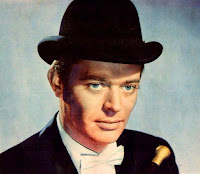 |
| Paul Massie as Hyde. |
 |
| Paul Massie as Jekyll. |
Watching the movie again, the thought came to me that people see in other people what they want to see (think of those young infatuated women who attended Ted Bundy’s trial); they also see in themselves what they want to see, whether they are being narcissistic or hyper-critical. So it’s becoming my interpretation that the film is subjective rather than objective, or at least an objectively presented story tainted with subjectivity; that it’s Jekyll’s own deluded dream of what happens, the account as he (or Hyde) writes it down in his notebook. For all we know, it could be Jekyll’s own belief in Hyde that persuades others that he is two different people. I shared these thoughts with my Facebook friends, some of whom pointed out that it is just a movie, and that the detail of Jekyll's vanishing/reappearing beard shouldn't be any harder to accept than his ability to change his sex back and forth in DR. JEKYLL AND SISTER HYDE (1971).
At the bottom line, this is a story - a fantastic story at that - I can accept as being told in a symbolic way. Indeed, after seeing this film ten times or more over the years, I’m beginning to wonder if Jekyll’s wife Kitty and the snake dancer are really two different women, as a big part of Hyde’s scheme is putting the two of them in each other’s beds - that is, reconciling them (and thus himself, in relation to them) in both his mind and libido. At any rate, this study in anarchy juggles more interesting ideas and issues than most other Hammer films combined, so it’s always been a favorite.
(c) 2019 by Tim Lucas. All rights reserved.